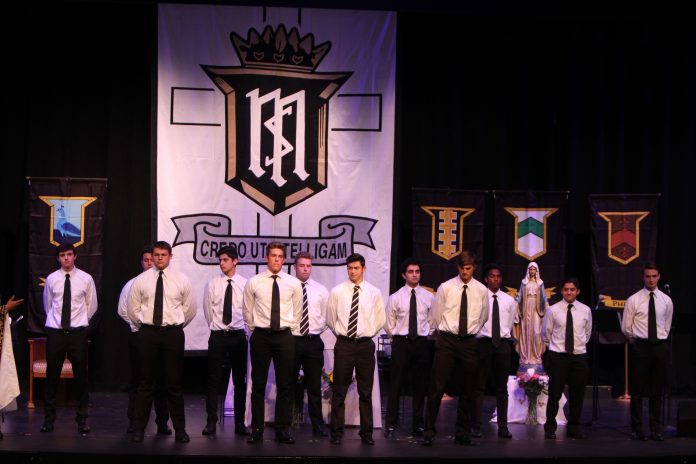At an all-school mass on Friday, April 13th, the new priory leadership for the 2018-2019 Academic Year was installed. The Priory Leadership Program is a comprehensive, hands-on leadership experience. The intent is to give students the opportunity to learn and practice leadership through peer accountability and increased responsibility in all components of the student experience.
The leadership for 2018-2019 is:
Prior General – Richard Krebs
Vicar General – Matthew Kuehl
Secretary General – Connor Buchanan
Treasurer General – Chase Coleman
Alexis Prior – Andy Foy
Amideus Prior – Ben Teske
Bonajucta Prior – Reily Garcia
Bonfilius Prior – Sam Moore
Hugh Prior – George Colaco
Manettus Prior – Brandon Leo
Philip Prior – Matthew Martinez
Sostene Prior – Erik Mercado
What Is the Servite Priory Leadership Program?
The Priory Leadership Program, inspired by the tradition of the Servite Order, is a comprehensive, hands-on leadership experience intended to give the Men of Servite the opportunity to practice community-based leadership and followership. This is accomplished through a variety of activities that move students toward growth as Servite Friars – growth in fraternity, service, and Marian devotion – and allow for a deeper understanding of who they are and how they are being called to lead.
What are the purposes of the Priory Leadership Program?
The fundamental weakness of most student leadership development programs is their lack of real leadership experience. Real leadership only exists when there is tangible responsibility and direct accountability for other people. With that in mind, there are four fundamental purposes of the Priory Leadership Program:
- Increased responsibility
- Peer accountability
- Critical understanding of leadership theory
- Hands-on leadership experience
By giving students significant responsibility in the operation of the school and direct accountability for their peers, students will gain the real experience that is required to successfully develop as the kind of leaders prepared to make a difference in their schools, churches, businesses, families, communities, and beyond.
How does the Priory Leadership Program work?
The Priory Leadership Program encompasses the entire student body. Students are divided into eight Priories (a Servite word for a community). Each Priory is comprised of 110-120 students (freshmen through seniors). The Priories are named after the Seven Holy Founders of the Servite Order with the addition of “Philip,” one of the primary Servite saints:
- Alexis
- Amideus
- Bonajuncta (pronounced “bōnăyūnctă”)
- Bonfilius
- Hugh
- Manettus
- Philip
- Sostene (pronounced “sŏstĭnay”)
Each Priory is led by a Prior and six Assistant Priors. The Prior and his Assistant Priors are expected to not only lead their Priory through a variety of activities and competitions with the other Priories, but also to uphold and enforce standards regarding moral discipline, academic performance, and leadership. Each Priory is further divided into six homerooms, led by one of the Priory’s six Assistant Priors. Under the direction of the Prior, the Assistant Priors not only plan but also implement their Priory’s goals and objectives within their homerooms. While the work of the Priors and Assistant Priors is continuous, the primary means of implementation of Priory activities is through the Priory Period which occurs weekly. Faculty/Staff Proctors are present within each homeroom for the purpose of guidance/mentoring and supervision, while the plan and its implementation for each period is left entirely in the hands of the Prior and his Assistant Priors.
The management of the entire Priory System is overseen by the Prior General and the other members of the Generalate – the Vicar General, Secretary General, and Treasurer General. The Generalate, in consultation with the Principal and Director of Leadership Development, determines the specific directives for the Priories each year. The Generalate is seen by the school administration as the primary representatives of the student body and is often consulted on a variety of school matters, large and small.













